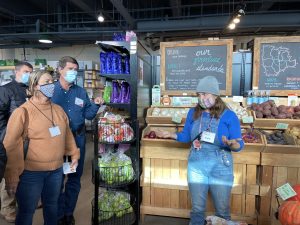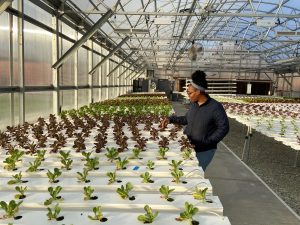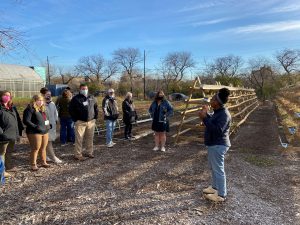Rural, urban farmers find common ground in passion for food
By Katie Zelechowski Illinois Farm Bureau — December 20, 2021
Farmers from rural Illinois recently toured Oak Park’s Sugar Beet Food Co-op to learn how the food hub creates food access opportunities for community members. (Photo by Katie Zelechowski of Illinois Farm Bureau)
Increasing access to fresh, locally sourced food and connecting families with how it’s grown are priorities for Chicago-based companies Sugar Beet Food Co-op and Herban Produce. During a recent farm-to-fork tour, 25 farmers from rural Illinois learned about the unique challenges both businesses face in the city.
The Taste of Illinois on Location event took place Saturday, Dec. 4, as part of Illinois Farm Bureau’s Annual Meeting, and highlighted similarities between different types of food production and shared values within agriculture across the state.
Sugar Beet Food Co-op, located in Oak Park, is a food hub created by area residents who needed a source of local, sustainable and healthy foods in their neighborhood. After four years of planning, the grocery opened in 2016.
“Generally, grocery stores are owned by corporations and those are people that are not in the community. Our store is actually owned by consumers, community members, people in the immediate area and producers,” said Regina Milkovich, education and community outreach coordinator for the co-op.
As a cooperative, the store is specifically designed to meet the needs and interests of its more than 2,400 owner members. Cost sharing efforts between produce, meat and prepackaged food departments, as well as the café, absorb premiums on expensive products to lower the overall cost to shoppers.
“We have a lot of people to feed and only so many grocery stores that are owned by a few corporations,” Milkovich said. “There’s a great chance to set a standard of what people really want in a grocery store and (show them) that they can be involved in the process.”
An extensive bulk aisle also helps consumers save, while providing new opportunities for local farmers and producers to sell products.

“We’ve really pieced together a sustainable business plan to make this a sustainable farm that will be here for decades to come” said Alicia Nesbary-Moore, co-owner of Herban Produce on Chicago’s West Side. The farm grows fresh vegetables, such as specialty varieties of lettuce and greens, in a greenhouse on the two-acre property. (Photo by Katie Zelechowski)
“It’s really beneficial to shopping because a lot of pricing is contained in the packaging – the hidden cost of food,” she said. “If you remove that out of the situation, we’re able to price things specifically for the retail price of food.”
Individual packaging can account for as much as 20 percent of the end product, Milkovich said.
Phil Wright raises cattle in Paris, Illinois, and worked as a grain buyer for 35 years. After retiring five years ago, he started a bread making business and sells his creations locally. Visiting the urban market reminded Wright of food insecurity in his hometown, where a fire recently destroyed the town’s only grocery.
“This experience to me proves that we all need to work together to create a sustainable food supply,” he said. “I don’t care if I’m from a small town in the middle of a cornfield in central Illinois, or in the middle of Chicago; we’ve got to work together.”
Alicia Nesbary-Moore, co-owner of Herban Produce on Chicago’s West Side, knows the value agriculture brings to a community.
Before the farm’s greenhouse was built in 2016, the land had been used as a dumping ground for trash and vacant cars since riots in the 1960s. As development progressed, area residents began asking questions about how food is grown on site and how it ends up on their tables.
“We’re in East Garfield Park, so it’s traditionally a Black neighborhood,” Nesbary-Moore said. “(The farm) really started to create this narrative and conversation (about food) within the community.”
The farm originally started as a nonprofit and transitioned to a for-profit business on two acres (or 15 city blocks) in 2020. The business grows 50 types of vegetables and fruits in a hydroponic greenhouse and 100 raised, outdoor garden beds. Produce is sold to area restaurants and consumers.

Herban Produce works to increase food access by selling directly to restaurants and residents in the community. Illinois farmers from rural parts of the state recently toured the urban farm to learn how diverse agriculture businesses can work together to fight food insecurity. (Photo by Katie Zelechowski of Illinois Farm Bureau)
A community supported agriculture (CSA) program offers subscriptions to community members who want to purchase fresh produce grown on the farm. Unlike traditional CSA models, where customers pay monthly or seasonal fees to finance the farm for a season upfront, Herban Produce subscriptions are made weekly.
The budget-friendly approach makes food boxes more affordable and accessible to residents.
An on-site event space also offers a place for people to take urban gardening classes focused on growing plants in small spaces like windowsills and patios. The farm also partners with other organizations to teach kids and young adults about farming.
“It’s an eye-opening experience for a lot of the youth because they’re exposed to agriculture right in their city,” Nesbary-Moore said. “They’re amazed that they’re able to farm right in the middle of the city.”
Educational opportunities create advocates for urban ag and empower others to join in finding solutions that work. Milkovich said big change can happen when people work together.
“Consumers can make better choices for themselves, and they don’t have to wait for a development to come into their community,” Milkovich said. “They can start fundraising and pursuing a co-op in their town that’s custom to what they need.”
This story was distributed through a cooperative project between Illinois Farm Bureau and the Illinois Press Association. For more food and farming news, visit FarmWeekNow.com.







